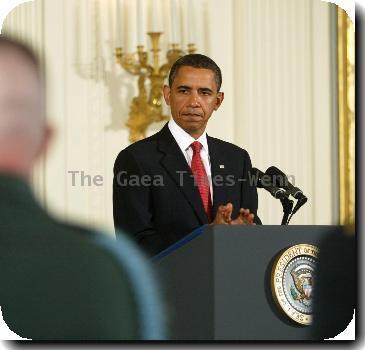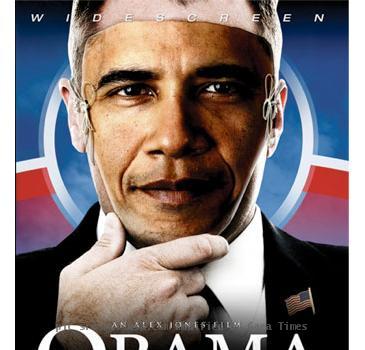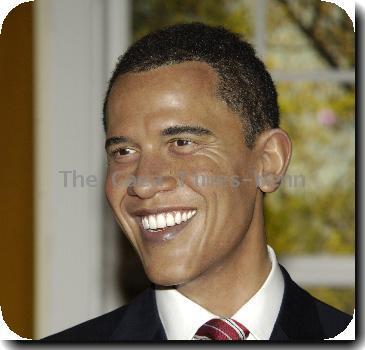Outsider Republicans keep winning, and desperate Democrats hope it will save them this fall
By Charles Babington, APWednesday, August 25, 2010
As GOP civil war rages, Democrats look to benefit
WASHINGTON — A Republican civil war is raging, with righter-than-thou conservatives dominating ever more primaries in a fight for the party’s soul. And the Democrats hope to benefit.
The latest examples of conservative insurgents’ clout came Tuesday at opposite ends of the country. In Florida, political newcomer Rick Scott beat longtime congressman and state Attorney General Bill McCollum for the GOP gubernatorial nomination. And in Alaska, tea party activists and Sarah Palin pushed Sen. Lisa Murkowski to the brink of defeat, depending on absentee ballot counts in her race against outsider Joe Miller.
The GOP is likely to survive its bitter intraparty battles in such states as Alaska and Utah, even if voters oust veteran senators in both. But tea party-backed candidates might be a godsend to desperate Democrats elsewhere — in Nevada, Florida and perhaps Kentucky, where the Democrats portray GOP nominees as too extreme for their states.
If Murkowski joins Sen. Bob Bennett, R-Utah, as a victim of party activists who demand ideological purity, other Republicans are still likely to win in November, though Minority Leader Mitch McConnell, R-Ky., would have to deal with more maverick members who are loathe to compromise. And the conservative insurgency is hardly all-powerful, as Sen. John McCain proved by easily winning renomination in Arizona despite a challenge from the right by J.D. Hayworth.
The Republican Party’s chief danger lies in battleground states such as Florida and Nevada, where great opportunities might slip away. President Barack Obama and his Democrats see a silver lining amid political troubles driven by high unemployment and a stubbornly slow economic recovery.
The White House has tried to link the Republican Party with the fledgling conservative-libertarian tea party coalition — and demonize the combination as too extreme for the country.
That’s “the Republican tea party” that’s “offering more of the past but on steroids” and is “out of step with where the American people are,” Vice President Joe Biden told the party’s rank and file last week.
Nevada Republicans’ nomination of tea party favorite Sharron Angle may save Sen. Harry Reid, the Democratic leader. His popularity has fallen sharply among state voters, but Democrats say Angle’s comments are scaring voters away from her and back toward him.
In Florida, the conventional wisdom was that McCollum, who had won election statewide, would be a stronger candidate than Scott against Democrat Alex Sink in the governor’s race. Democrats are certain to assail at least one aspect of Scott’s private-sector history: the $1.7 billion that Columbia/HCA hospital corporation paid to settle Medicare fraud charges when he was chief executive officer. In the Republican primary, Scott spent $39 million of his own money to promote his campaign and beat back such attacks.
In a sign of the Democratic Party’s own relative calm this year, Florida’s other insider-vs-outsider contest turned out much differently. Democratic Rep. Kendrick Meek defeated millionaire newcomer Jeff Greene for the party’s Senate nomination.
Even if GOP nominees make some rookie mistakes, general election voters might embrace them, said Republican strategist John Feehery. “This is a ‘big change’ election,” Feehery said. “If you are defending the establishment, you are in big trouble this time around.”
Still, tea party activism could cause worries for Republicans in Florida’s Senate race. Conservative Marco Rubio essentially chased Gov. Charlie Crist, then a Republican, out of the party. But a Meek-Rubio split of the vote on Nov. 2 could allow Crist to win the Senate seat as an independent, and he might caucus with Democrats in Washington.
In several other states, the likely impact of anti-establishment fervor and tea party activism is unclear.
Kentucky Senate nominee Rand Paul defied the GOP establishment and gave Democrats some ammunition with his strongly libertarian stands. But many expect him to defeat Democrat Jack Conway in November.
The dynamic is similar in Colorado. Senate nominee Ken Buck beat an establishment favorite in the Republican primary. And some polls show him ahead of Democratic Sen. Michael Bennet.
In Connecticut, the Senate race appears tight between millionaire Republican newcomer Linda McMahon and Democrat Richard Blumenthal, the state’s longtime attorney general.
A few more Republican intraparty battles will play out in primaries on Sept. 14.
In New Hampshire, party elders have urged Senate rivals Bill Binnie and Kelly Ayotte to soften their attacks on each other. A new ad by Binnie, a businessman, says Ayotte is an insider whose front-runner campaign is funded by lobbyists. Ayotte, a former attorney general, says Binnie also takes campaign cash from lobbyists, and is a liberal to boot.
The survivor will face Democratic Rep. Paul Hodes on Nov. 2.
White House Communications Director Dan Pfeiffer said Republicans are hurting their chances this fall “by nominating candidates well outside the mainstream.”
But Washington-based Republican adviser Kevin Madden sees some good news in his party’s intraparty clashes. Conservative voters are energized, he said, and they will remain so through November, when many Democrats are likely to be dispirited.
Polls show non-establishment candidates such as Angle, Paul and McMahon either ahead or in striking distance, Madden said. More importantly, he said, voters this fall won’t care so much about libertarian-leaning comments about Social Security or other issues.
This election “is about one big thing,” Madden said. “It’s about the economy.”
And that issue will play into the hands of GOP candidates, he said, whether they are establishment figures or not.
Associated Press writers Liz Sidoti and Philip Elliott contributed to this report.
Tags: 2010 United States General Election, Barack Obama, District Of Columbia, Events, Florida, General Elections, Kentucky, Lisa murkowski, Lobbying, Nevada, North America, Personnel, Political Issues, Political Organizations, Political Parties, Sarah palin, Senate Elections, State Elections, United States, United States General Election, Washington








